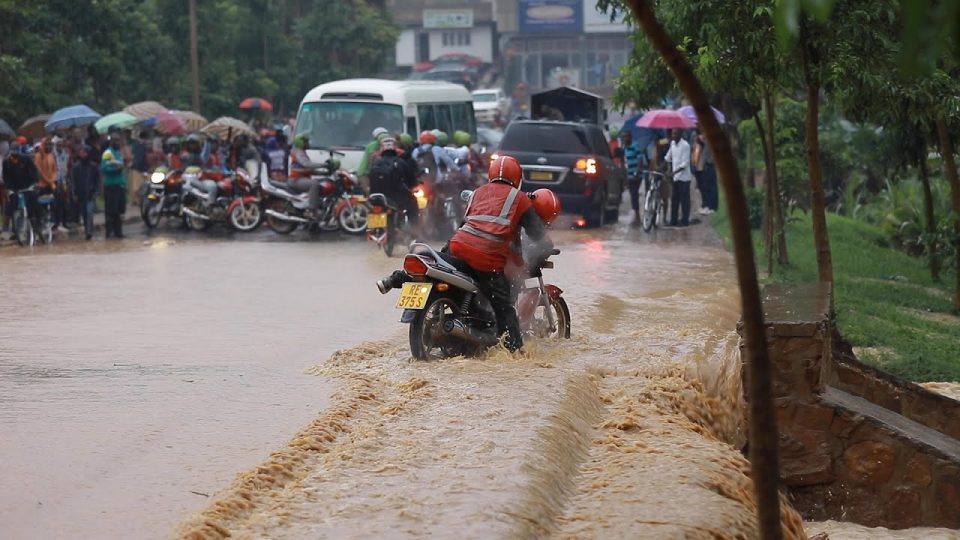Government is identifying ‘disaster hotspots’ that could be hit by floods and landslides across the country to be able to relocate more families from high-risk zones ahead of the March to May heavy rains, ACP Egide Mugwiza, Director General of Response and Recovery Operations at the Ministry in charge of Emergency Management (MINEMA), said. The New Times reports
He was reacting to the weather forecast released on February 23, 2024, which indicated that predicted rains are above normal rains recorded in the long-term average.
“The country faced heavy rain from September 2023 where 39 people were killed by disasters, and it will continue in the next three months. Last year some people lost their lives, properties and infrastructure.
“We took measures and relocated many families from high-risk zones during the concluded rainy season which started in September. We are also identifying disaster hotspots to relocate more families ahead of March to May rains,” he said.
Fourteen districts with households in need of urgent relocation from high-risk zones have been identified. The districts include Rubavu, Karongi, Rutsiro, Ngororero, Nyabihu, Burera, Rusizi, Rulindo, Gicumbi, Gakenke, Nyamasheke, Nyamagabe, Musanze, and Muhanga.
“Since January up to now, in partnership with other institutions, we have been assessing to identify all disaster hotspots that could be affected by landslides and floods. The activity was completed this week in Western Province, Northern Province, and a small part of Southern Province in Nyaruguru, Nyamagabe, Muhanga and City of Kigali,” he said.
He said the identified disaster hotspots are being put on maps as families living in the areas are identified and relocated.
Mugwiza said the assessment is being conducted in collaboration with the local government ministry, Rwanda Meteorology Agency and others.
Districts to face heavy rains
Aimable Gahigi, Director General of Rwanda Meteorology Agency, said that the climate outlook for the March to May 2024 season indicates higher chances of above-normal rainfall conditions influenced by global, regional and local patterns.
Rainfall ranging between 700 and 800 millimetres is expected in eastern parts of Rusizi and Nyamasheke, southern parts of Karongi, western parts of Nyamagabe and Nyaruguru Districts and over Musanze and Nyabihu, northern and western parts of Gakenke and Burera, northeastern parts of Rubavu and Ndiza areas of the Muhanga District.
Rainfall ranging between 600 and 700 millimetres is expected over Rutsiro, parts of Rubavu, Rulindo, Gicumbi, western parts of Huye, Nyamasheke, Rusizi and Nyanza; eastern parts of Nyamagabe, central parts of Muhanga and northern parts of Ngororero District.
Rainfall ranging between 500 and 600 millimetres is expected in the City of Kigali, southern parts of Rwamagana, northern parts of Ngoma, western parts of Bugesera, most parts of Kamonyi, Gisagara, Ruhango, Nyanza, Southern parts of Muhanga and Ngororero as well as Eastern parts of Huye and Nyaruguru districts.
Rainfall ranging between 400 and 500 millimetres is expected over Kirehe district, in most parts of Kayonza, western parts of Nyagatare and Gatsibo districts, eastern and northern parts of Rwamagana, southern and western parts of Ngoma, most parts of Bugesera and southeastern parts of Gicumbi District.
Rainfall ranging between 300 and 400 millimetres is expected in the northern parts of Kayonza, as well as most parts of Gatsibo and Nyagatare districts.
Very heavy rain with high or severe impact starts above 40 millimetres.
“The seasonal rainfall for March-May 2024 is expected to be above normal which is an indication of a high likelihood of extreme weather events which are associated with localised flooding, landslides, and strong winds in different parts of the country,” Gahigi said.
He called for measures such as appropriate harvesting and post-harvesting handling activities, timely planting, rainy water harvesting, drainage, erosion control, precautions in mining areas, lightning protection measures as well as relocation from disaster-prone areas to safer areas.


